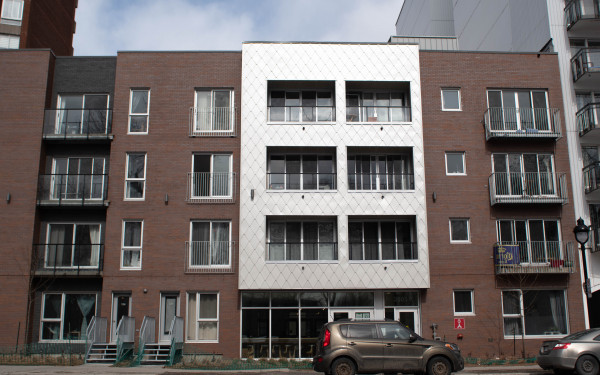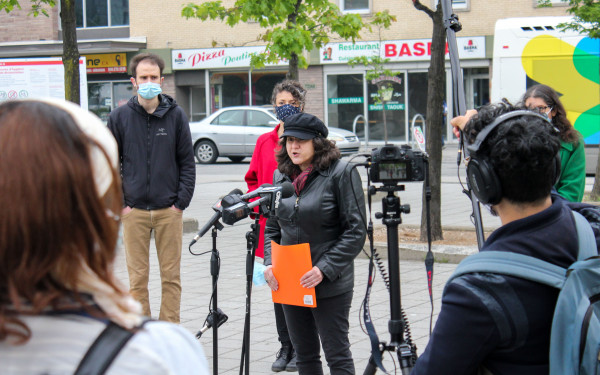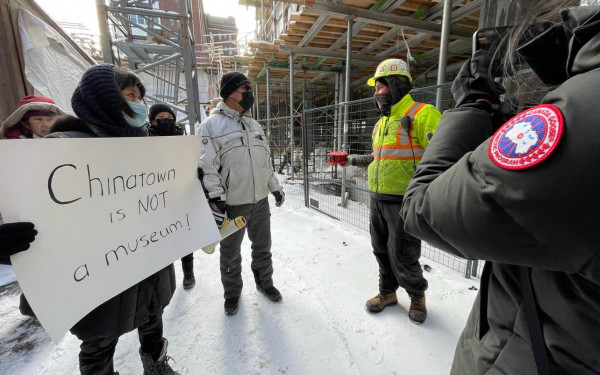Conned by the Moratorium
Condo Ban Does Little to Stop Development
Walk along the Lachine Canal, or through St-Henri and you’ll spot it. Amid the low-rise brick buildings, sign after sign advertising a new condominium development coming soon, directing you to the sales office a few blocks over.
The continuing pattern of development and gentrification, particularly in neighbourhoods like St-Henri or Griffintown, has long been a source of conflict between the different parties involved, and in a recent presentation by Concordia urban planning students in the year-long class Urban Laboratory, another area emerged as a significant site of gentrification and unsanctioned condo development.
It was revealed that in the Rosemont-La Petite-Patrie borough, the proportion of rental units has decreased by nearly 20 per cent over the last 22 years—all as a result of condo conversions. The students also found that, on specific streets like St. Andre St., the change has been even more dramatic, shifting from 93 per cent in 1991 to a mere 35 per cent in 2013.
Analysis from the Canada Mortgage and Housing Corporation reveals that the number of unsold condominiums on the island will likely continue to increase, which would seem to suggest that the need for more condo developments isn’t even there in the first place.
In theory, the drastic decreases in rentable units in areas like La Petite-Patrie should not exist, as Montreal has had a condo moratorium in place since 1975. That has done little to stop the semi-legal—and often outright illegal—condo conversion that happens across the city. The moratorium applies to the entire city though is not enforced, leading to the disturbing trend of unsanctioned condo development in numerous neighbourhoods.
The moratorium was initially put in place with the intention of increasing the number of housing units available for purchase rather than rental, while simultaneously trying to maintain a solid base of units available for rental.
While there are those who support the moratorium, the loopholes that allow for condos to be semi-legally or illegally developed increases the strain being placed on those who cannot, or choose not to, purchase their homes; people who cannot afford to own rather than rent, and people like us—students, who are vulnerable to rental rates and the availability of affordable housing.
Two separate spheres must be taken into consideration with the moratorium as it stands now—home ownership and the availability of affordable housing available for rent.
Petite-Patrie, along with places like Griffintown and St-Henri, is being entirely reshaped through gentrification that, coupled with the unregulated moratorium, threatens the socio-economic structures that exist in these areas. Historically places of lower income residents, new developments in these areas force some of the most vulnerable people in the city out as they become unable to afford to live there.
The city has an inclusionary zoning policy. With such a policy, developers are required to ensure that a certain number of units in a construction project are reserved for affordable housing, but because the policy falls under provincial jurisdiction it becomes difficult to properly enforce.
As a result, those who cannot afford the lofty condo price tag are left out in the cold.
The zoning policy as it stands calls for 30 per cent of all new residential housing to be affordable, 15 per cent dedicated to social and community housing and another 15 per cent reserved for units that are either affordable to rent or own. In theory this would provide a significant number of units to those who need them. In reality, it isn’t the case.
It isn’t hard to see why the inclusionary policy is important; in areas like Petite-Patrie, where a significant number of residents are unemployed or low income, and where many rent, rather than own, their homes, the existence—and enforcement—of such a policy is key to ensuring that residents have a place to hang their hats.
Perhaps the most promising avenue to changing this would be to grant the city permission to take charge of enforcing the inclusionary policy. Given that the city arguably understands its demographics and its needs better than the provincial government, it’s puzzling as to why it doesn’t already have control over this policy.
As is the case with many governmental problems, increased transparency and the availability of documents, like those explaining precisely what the moratorium entails, could go a long way in ensuring that tenants are not taken advantage of. If tenants aren’t even aware that such a policy exists, how can they know when they’re being exploited or treated unfairly?
It’s imperative that the moratorium policy be modified to ensure that the loopholes are closed. There’s no point in maintaining a policy that does little to curb the displacement of residents, but the policy itself should not necessarily be scrapped.
Instead, policy-makers should focus on closing loopholes like the one permitting building owners to convert rental units into undivided co-ownership spaces—where individuals own portions of the entire property—from which point the property can be converted into divided condominiums with only the approval of the Régie du logement.
This makes it possible for property owners to convert rental property into something that equates to essentially the same thing as a condo with negligible efforts, indicating a serious flaw in the moratorium.
The lack of regulation for conversion of rental spaces into these undivided co-ownership spaces represents a troubling disparity in the moratorium; property owners can use the loophole as a way of avoiding red tape, and the end result is the same: lower-income residents being forced out as the rent becomes too high.
As part of his platform during the mayoral race, Denis Coderre said the city should buy abandoned land and buildings around the island to reserve them for the development of community housing, and that “Montreal must fight inadequate housing using all its powers.”
It’s a promising start, and it’s time that Coderre acts on it in a meaningful way—something that starts with regaining control over the zoning policy and finding a way to better enforce this moratorium.
After all, what good is a moratorium if the precise thing it’s supposed to quell instead flourishes?

_copy_900_300_90.jpg)


_600_375_90_s_c1.jpg)


